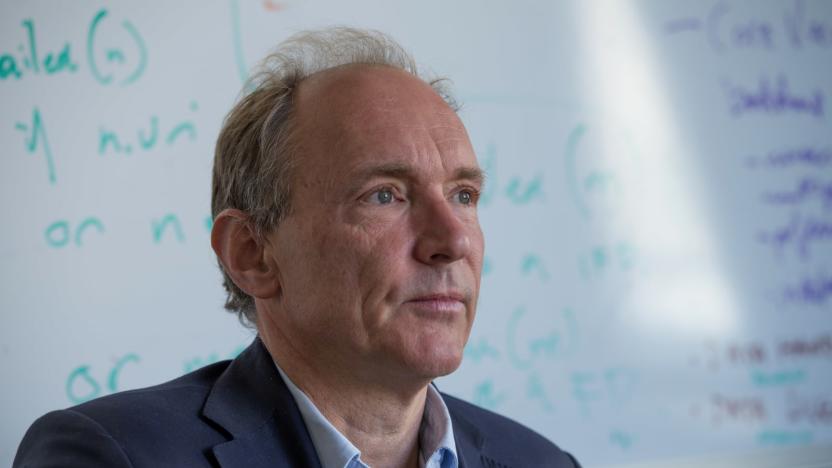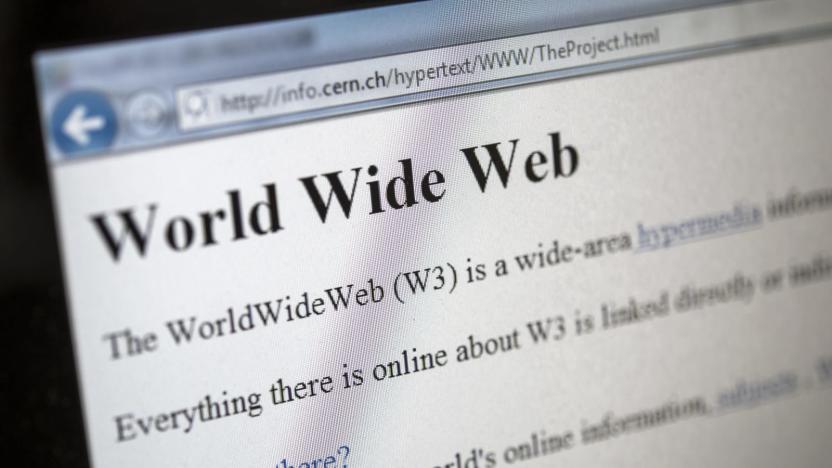TimBerners-lee
Latest

The World Wide Web at 30: We got the free and open internet we deserve
This isn't the internet that Tim Berners-Lee envisioned when he laid the groundwork for the World Wide Web 30 years ago today. Rather than the free and open online utopia he envisioned, "the web has evolved into an engine of inequity and division," he wrote in 2018, "swayed by powerful forces who use it for their own agendas." And, by God, he's going to fix it -- even if he has to break the entire system to do so.

Tim Berners-Lee project gives you more control over web data
After incidents like Facebook's Cambridge Analytica scandal, it'd be understandable if you felt like your data wasn't really under your control. Web pioneer Tim Berners-Lee hopes to put that data back in your hands -- he's been collaborating with people at MIT and elsewhere on a startup (Inrupt) whose open source project, Solid, gives you the final say over personal info. You can decide where the data goes, who's allowed to see certain elements,which apps can access that data. You can peek at the same data with two different apps, and share data with whoever you like.

Recommended Reading: Self-driving cars still have a lot to learn
Self-driving cars are headed toward an AI roadblock Russell Brandom, The Verge It's no secret that the auto industry is racing towards production of fully autonomous vehicles. A number of companies say they can achieve the feat in the next year or so; however, critics say it may be a while longer before you're able to completely relax during your commute. The Verge explains why AI experts argue self-driving cars could be years or maybe decades away from being able reliably avoid accidents.

The father of the world wide web is one disappointed dad
Today is the World Wide Web's 29th birthday, and to celebrate the occasion, its creator has told us how bad it's become. In an open letter appearing in The Guardian, Tim Berners-Lee painted a bleak picture of the current internet -- one dominated by a handful of colossal platforms that have constricted innovation and obliterated the rich, lopsided archipelago of blogs and small sites that came before. It's not too late to change, Lee wrote, but to do so, we need a dream team of business, tech, government, civil workers, academics and artists to cooperate in building "the web we all want."

Web pioneer Tim Berners-Lee wins computing's highest award
World Wide Web pioneer Tim Berners-Lee just chalked up another accolade, and it's one of his greatest yet. The Association for Computing Machinery has given him the 2016 Turing Award, frequently considered the Nobel Prize of the computing industry. He's receiving the award not just for inventing the basics of the web, but designing them in an elegant way. His concepts for links (URLs and URIs) were simple and easy to implement, while making HTML the heart of the web helped anyone publish info in a practical format.

The first website went public 25 years ago
The internet just marked another major milestone. The first website, Tim Berners-Lee's description of the World Wide Web project, went public 25 years ago on August 6th, 1991. The launch was unceremonious -- Berners-Lee announced the project on a Usenet group, and it wasn't until after August 23rd that new users visited the site. However, the launch effectively marked the start of the web as a widely available tool.

The first website went online 25 years ago today
If the web were a person, it wouldn't have trouble renting a car from now on: the world's first website, Tim Berners-Lee's World Wide Web, went online 25 years ago today. The inaugural page wasn't truly public when it went live at CERN on December 20th, 1990 (that wouldn't happen until August 1991), and it wasn't much more than an explanation of how the hypertext-based project worked. However, it's safe to say that this plain page laid the groundwork for much of the internet as you know it -- even now, you probably know one or two people who still think the web is the internet.

The inventor of the web wants you to help create an internet bill of rights
The web has changed a lot in the 25 years since Tim Berners-Lee first proposed its underlying technology, and not entirely for the better -- censorship, reduced net neutrality and surveillance are very real concerns. Berners-Lee and a host of partners are fighting these threats by launching Web We Want, a campaign pushing for an internet bill of rights in every country. The initiative asks you to start a discussion about the web you'd like to see, and to draft a matching set of rights. It's also fostering education efforts, offering small support grants and rallying groups at critical moments. There's no certainty that Web We Want will make a tangible impact, but it should provide a stronger voice to advocates of a free and open internet.

CERN celebrates 20 years of a free, open web by restoring world's first website
The web as we know it was famously invented by Tim Berners-Lee while working at CERN, but it wasn't until a few years later -- 1993 to be precise -- that it'd truly be set free. On April 30 of that year, Berners-Lee's then employer would make the technology behind the WWW available license free, bundling a basic browser and some key chunks of code into the deal. To commemorate the 20th anniversary of this event CERN has recreated the first ever website, complete with its original URL. The preservation doesn't stop at copying over some old files, either, with CERN also looking to preserve the first servers used, restoring as much as possible to its original state. Beyond a little geeky nostalgia, the project hopes to safeguard the web's earliest days, before it became the ubiquitous phenomenon it is now, so that future generations can enjoy (and scoff) at the web's origins. Best of all, no drawn-out field trip is required to enjoy the spectacle, you can see it just as nature intended by heading to the source.

World Wide Web turns 20, finally shakes that acne problem
Happy birthday, World Wide Web! Hard to believe you're turning 20 already. It seems like just yesterday we were hearing the pitter patter of little dial-up, delighting at the words "you got mail," and getting frustrated when calling our friends and receiving that dreaded busy signal. You're all grown up now, helping people learn how to farm and become overnight pop sensations. What, we wonder, will the next 20 years bring? At the very least, you'll eventually have to move out of your parents' basement, get a real job, and settle down. It's hard to pay attention to that kind of stuff, though, when you've got another year of sneaking beers ahead of you. So go ahead, World Wide Web, enjoy yourself tonight -- just make sure to be home by midnight.

Sir Tim Berners-Lee signs up to verily protect UK net neutrality
Here in the US we're still looking for a knight in shining armor to protect our free and open internet, but in the UK they've found their guy. Now they just need some plate mail. It's Sir Timothy John Berners-Lee, the man who first proposed the World Wide Web to the World Wide World in 1989. He'll be working with the UK's Broadband Stakeholder Group to ensure that any traffic management policies that go into effect are done with transparency and within a set of defined best practices. That is to say: corporations will still have an opportunity to address threats to the overall health of their networks, but they'll need to do so in an open way. Communications Minister Ed Vaizey summarized it thusly: That agreement should be guided by three simple principles. The first is users should be able to access all legal content. Second, there should be no discrimination against content providers on the basis of commercial rivalry and finally traffic management policies should be clear and transparent. So, that's good news for those across the pond. Here in the US, well, we'll just keep braiding our hair and singing out the tower window as loudly as possible. Or maybe it's time to give Tim Wu a sword. [Photo credit: Paul Clarke]

Tim Berners-Lee entreats us to keep the net neutral, standards open, and speech free
We've always thought pretty highly of this Tim Berners-Lee fella, and now we've got a whole essay penned by him to show you why that is. In a six-page treatise on the current state of the web, Tim discusses why universality of access is so important to our freedom of speech and other democratic liberties, why open standards will always prevail over closed ecosystems (with a special critique of Apple's iTunes and concordant appification of the web), and also why it's necessary to distinguish between the web and the internet. Oh, and he also manages to squeeze in one of the most succinct explanations of net neutrality and its growing importance in our massively interconnected world. Hit the source for the full shot of enlightenment. [Image courtesy of Paul Clarke]

World Wide Web creator sorry for the '//' and other things that don't matter
Tim Berners-Lee, the man credited with creating the World Wide Web, recently said that his only real regret about the whole shebang is forcing people to type out the (essentially unnecessary) double slash after the 'http:' in URLs. Speaking at a symposium on the future of technology, he noted (in reference to the dreaded marks) the paper, trees and human labor that could have been spared without them. Hey Tim: don't sweat it! You've done us enough good turns that we're willing to overlook it.





